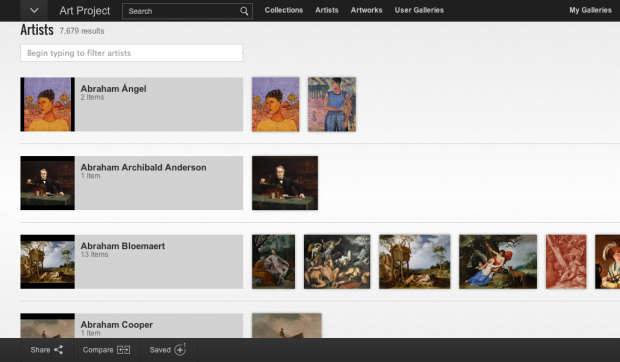Google Art Project quietly unveiled a redesign this week. Cosmetic changes are minimal: parts of the interface have been changed from black to gray, the search function now includes thumbnail-sized images, and a cleaner navigational toolbar. No bells and whistles, there. Overall, the site pretty much looks the same, and it still lets you gaze at high-quality images of artworks found inside the world’s major museum collections.
The major remodel belongs to a curious naming game: Google Art Project will now be part of the Google Cultural Institute, an umbrella organization housing Google’s Art Project, Historic Moments, and World Wonders.
With Art Project now under its wing, the Google Cultural Institute continues the corporation’s commonly known mission to “organize the world’s information and make it universally accessible and useful”. More than helping to organize museum information, Google Cultural Institute has begun crafting original exhibitions. Historic Moments consists entirely of exhibitions made just for the site by experts in the field, individual curators and museums.
It seems, then, that Google Cultural Institute is taking on the role of a virtual mega-museum. In addition to hosting exhibitions, the Google Cultural Institute is hoping to institute global museum standards. Soon after the institute was first made public in 2011, the Institute’s Director Steve Crossan told The New York Times about their wide-reaching plan:
In addition to working with individual museums and archives, Mr. Crossan said, the engineers intend to develop a standard set of tools that any institution could use to digitize its collection. That way, even small, private archives or collections could be placed online in formats that would make them easily accessible to broad audiences.
So far, more than 200 museums participate in Art Project, making more than 40,000 images of artworks publicly available. But not everyone’s convinced about the project. The Louvre remains notably absent, but its images have found a home online in a digitization project launched under the helm of France’s former President Nicolas Sarkozy. In 2009, Sarkozy responded with a brash warning about Google’s global digitization projects: “We won’t let ourselves be stripped of our heritage to the benefit of a big company, no matter how friendly, big or American it is.”



Comments on this entry are closed.